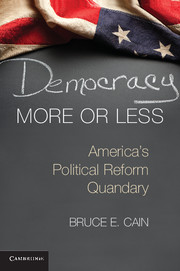Book contents
8 - Election Administration or Policy?
Published online by Cambridge University Press: 05 December 2014
Summary
Rules and procedures are necessary for running elections properly. They determine such essential details as voter eligibility, candidate qualifications, balloting, and vote counting. Even though the United States has been conducting elections since the eighteenth century, America election administration issues are still unsettled. Indeed, they have become more politicized since the 2000 presidential election.
The Florida 2000 and Ohio 2004 presidential election controversies elevated the public salience of administrative arcana such as butterfly ballots, voter registration purges, provisional ballots, and recount procedures. As hanging chads and punch card machines receded from the spotlight, photo identification, voter caging (i.e. challenging a voter’s registration status), and third-party voter registration requirements took their place. Democrats and Republicans now routinely deploy teams of lawyers to watch for polling place irregularities and to contest rules that might work against their party’s interest. Election-related litigation has proliferated over the last decade (Hasen, 2012c).
America is distinctive among advanced democracies in this regard. Other OECD countries rarely fight over the nitty-gritty of casting and counting votes. And when they do, it is sometimes because they have adopted American electoral practices like party primaries, as was the case with the Union for a Popular Movement’s 2012 recount dispute in the nomination battle to replacing Nicholas Sarkosy (France 24,2012). Voting administration battles are primarily an American spectacle. Why is this so?
- Type
- Chapter
- Information
- Democracy More or LessAmerica's Political Reform Quandary, pp. 170 - 193Publisher: Cambridge University PressPrint publication year: 2014



